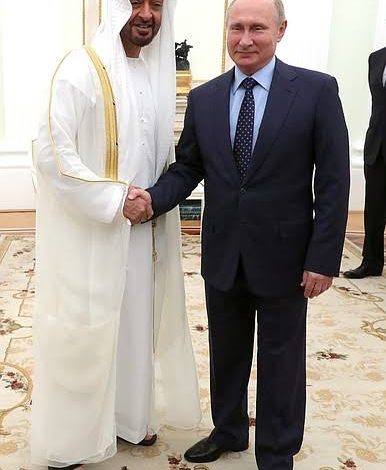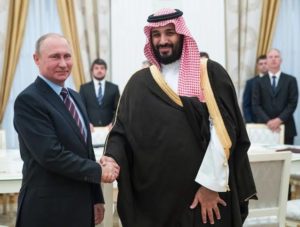
Ahmed Moustafa
Director of Asia Center for Studies & Translation
Intro
Putin’s visit to Saudi Arabia (KSA) and the United Arab Emirates (UAE) today, Wednesday dated December 6th, 2023, underscores Russia’s increasing interest and influence in the Middle East. We can analyze the main targets behind Putin’s visit. The first objective is to strengthen economic ties and expand Russia’s presence in the region. Both KSA and UAE are major players in the global oil market, and Putin aims to deepen energy collaboration and explore investment opportunities. Secondly, Putin seeks to gain political influence and challenge the dominant Western presence in the Middle East. By forming strategic alliances with key regional powers, Putin aims to reshape geopolitical dynamics, particularly in the context of ongoing conflicts such as Palestine, and trying hard to ceasefire and give Palestinians their state, as well as Syria and Yemen. Finally, Putin’s visit also serves as a platform to showcase Russia’s military might, especially its advanced weaponry and defense systems, which could potentially attract buyers from KSA and UAE.
Strengthening Russia’s role in global energy trade with partners Saudi Arabia and the UAE
Putin’s visit to KSA and UAE is driven by an economic agenda. Both countries possess vast reserves of oil and natural gas, and Russia, being a major energy producer, seeks to expand its footprint in the region. Saudi Arabia, as the largest exporter of oil globally, has an established relationship with Russia through their cooperation in managing global oil prices. Putin aims to deepen this collaboration and explore joint ventures in areas such as oil exploration, production, and refining. Similarly, the UAE has also been actively diversifying its economy beyond oil, and Putin seeks to capitalize on this by promoting Russian investments in sectors such as real estate, infrastructure, technology, and defense. By enhancing economic ties, Putin aims to solidify Russia’s role as a key player in the Middle East.
Great Russian political interests in the region versus the West
In addition to economic interests, Putin’s visit to KSA and UAE has significant political implications. The region has traditionally been influenced by Western powers, especially the United States. Putin aims to challenge this dominance by forming strategic alliances with key regional players. By aligning with the likes of Saudi Arabia and the UAE, Russia aims to position itself as a diplomatic and military mediator in regional conflicts. In Syria, for instance, Russia has been a primary backer of the Syrian regime, supporting President Bashar al-Assad. By cultivating closer ties with KSA and UAE, Putin hopes to gain more influence in resolving the Syrian conflict on his terms, marginalizing Western involvement. Similarly, in Yemen, Russia aims to provide an alternative narrative to the Saudi-led coalition, potentially opening doors for diplomatic negotiations.
An implicit victory over NATO strengthens Russia’s role in our region
The conflict between Ukraine and Russia has led to Vladimir Putin’s victory tacitly, as NATO failed to counter Putin’s annexations. The Russian army’s powerful and influential presence surrounded Ukrainian forces, leaving no room for escape. Putin managed to push Ukraine’s forces back significantly, resulting in NATO’s inability to stop Putin’s advance. The former British PM Boris Johnson pressured Ukraine not to accept peace negotiations at the beginning of the Russian special operation, as Johnson mistakenly believed that NATO could defeat Putin and defeat the Russian army, leading to Putin’s victory in the conflict. The British Daily Express newspaper reports that British experts are now convincing Ukraine to negotiate with Russia. Technically, this triumph gives Russia and Putin weight and strength in carrying out any talks with any country worldwide.
Success in Syria and Ukraine enhances the sale of Russian arms to Saudi Arabia and the UAE
Putin’s visit also serves as a platform to showcase Russia’s military prowess. Both KSA and UAE, being military spenders in the region, have shown a willingness to diversify their defense procurement beyond traditional Western suppliers. Russia, known for its advanced weaponry and defense systems, sees this as an opportunity to attract buyers from KSA and UAE. By highlighting successful deployments of Russian-made equipment in conflicts like Syria, Putin aims to present Russia as a reliable and capable partner in the defense sector. This not only enhances economic prospects for Russian defense industries but also strengthens Russia’s overall geopolitical reach and influence in the region.
Membership of Saudi Arabia and the UAE in the BRICS Plus alliance
Russian President Vladimir Putin, Saudi Arabia, and the UAE are discussing their potential membership in the BRICS bloc, a significant development in the global geopolitical landscape. The inclusion of these countries would not only expand Saudi Arabia and the UAE’s geopolitical influence but also strengthen their economic ties with emerging economies. This move would also help redress alleged Western dominance in international organizations and grant BRICS more leverage in negotiations related to key global issues.
For Putin, the discussions around BRICS membership showcase his strategic vision to expand Russia’s influence and bolster its global power. By expressing interest in joining BRICS, Putin recognizes an opportunity to broaden the organization’s reach and cultivate a greater sphere of influence. This pivot towards established regional allies in the Middle East serves Russia’s geopolitical interests by positioning itself as a reliable partner for key countries with significant economic and military power. Such partnerships help offset isolation resulting from Western sanctions and assert Russia’s ability to forge alternative alliances that challenge the current global balance of power.
Russia seeks to get rid of dollarization with its allies in the region
Russian President Vladimir Putin has been advocating for the dedolarization of the economies of Saudi Arabia and the United Arab Emirates (UAE), a move aimed at challenging the dominance of the US dollar and weakening its position as the world’s primary reserve currency. This move may be driven by Putin’s desire to break the American hegemony and its control over global financial systems. The US dollar’s dominance provides the US with an unparalleled advantage in setting economic and political agendas globally. By advocating for dedolarization in major oil-producing nations like Saudi Arabia and UAE, Putin aims to erode the dollar’s influence, gain leverage, and reshape the international monetary landscape. The dedolarization drive can also be seen as a strategic maneuver to reduce Russia’s vulnerability to fluctuations in oil prices, as the dollar plays a crucial role in determining global oil prices.
A Real Attempt to Find a Solution to the Conflict in Gaza
Russian President Vladimir Putin is engaged in discussions with Saudi Arabia and the United Arab Emirates (UAE) to resolve the ongoing conflict in Gaza and establish a truce. Putin’s goal is to strengthen Russia’s global power and enhance its influence in the Middle East. By involving these countries in discussions, Putin demonstrates his understanding of their central role in the region’s geopolitics and the importance of their support for peace initiatives. The complexities surrounding the Gaza conflict, characterized by historical, religious, and territorial factors, make it a challenging issue to resolve. Putin’s intelligence and comprehension of the situation are evident in his efforts to engage influential regional actors who can contribute to a solution that includes the aspirations of both Palestinians and Israelis.
The invitation to a Hamas delegation to visit Moscow raises questions about Russia’s geopolitical strategy and the complex dynamics of the Middle East. Understanding this invitation requires a nuanced understanding of Russia’s geopolitical strategy and the Middle East’s dynamics. It may be driven by enhancing Moscow’s influence, preserving regional stability, and potential diplomatic benefits. Additionally, the invitation raises concerns about Russia’s stance on counterterrorism and its implications for its relationships with key Western allies.
In conclusion, Putin’s visit to the KSA and UAE aims to strengthen economic ties, expand Russian influence in the Middle East, and showcase Russia’s military capabilities. He plans to deepen Russia’s presence in the region by engaging with major oil market players, forming alliances with Saudi Arabia and the UAE, challenging Western dominance, and showcasing advanced weapons systems. The discussions between Putin, Saudi Arabia, and the UAE regarding their potential membership in BRICS reflect a significant development in the international political landscape. The inclusion of these Middle Eastern countries would enhance the economic and geopolitical prowess of BRICS and provide Russia with an opportunity to enhance its international standing. Putin’s push for dedolarization in the KSA and UAE reflects his strategic vision and pursuit of challenging American hegemony. His engagement with KSA and UAE representatives to discuss a truce in Gaza and the establishment of a Palestine state highlights his intelligence and comprehension as a seasoned global leader.




